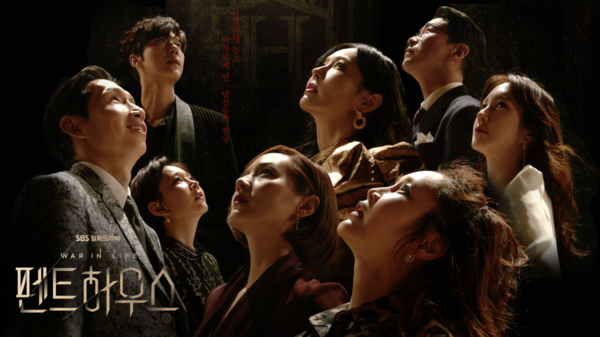Ridiculous plot twists, dramatic, unrealistic scenes, and an illogical storyline are some prototypical characteristics of a makjang K-drama. The must-have elements are adultery, birth secrets, and murder that can create the most unexpected situations and shock the audience. While the main viewers of makjang dramas used to be from an older demographic, the main consumers of such dramas nowadays are younger viewers in their 20s and 30s, exemplified in the recent success of the K-drama The Penthouse: War in Life.

The Penthouse follows the lives of families living in a luxurious apartment called “Hera Palace”, where parents fight for wealth and power while children compete to get into the prestigious “Cheong-A Arts High School”. The second season ended with a 25.8% viewer rating in April, ranking first amongst all miniseries dramas that aired at the same time. This success resonates with another viral drama aired last year called The World of the Married, which became the most viewed drama from a non-major broadcasting company, JTBC. A remake of the British series Doctor Foster, the drama features a story of a couple betraying and taking revenge on one another.
Makjang stories have been treated as outdated by many but are recently regaining popularity and attention from a wider audience, prompting us to ask, why the sudden reversal in this trend? Makjang dramas provide a virtual world where viewers can fully immerse themselves into for an hour or two. In other words, during this time, viewers can shut off their brains and forget about the real world and whatever harsh, distressing situation they are facing. Somewhat ironically, the audience seems to relieve stress from watching characters kill, shout, and plan revenge on each other better than “healing” dramas with intimate, heart-touching messages.
The above explanation seems plausible, but not enough to explain why these dramas have drawn the attention of a younger generation of viewers. Not surprisingly, the main factors in play are memes and YouTube. Most young audiences have switched to online streaming platforms such as Netflix and Watcha, as well as YouTube; less and less are watching network television. Scenes from a makjang drama are very dramatic and attention-grabbing, which satisfies young users’ desire to watch a short, entertaining clip for 10 to 20 minutes. The titles of these clips, as well as the comment section, contain puns or humor using certain lines or characters from the drama. Even the scenes that seem too absurd and ridiculous are consumed comically and become popular memes that appear in daily conversations. Moreover, when YouTubers film reaction videos or imitations of certain lines or characters, people will talk about the drama endlessly. The effective use of online platforms has significant commercial as well as economical value with the expanding online video platform markets, amplifying the promotional effect.
While I understand the driving force behind makjang dramas becoming mainstream, I do find them problematic. By continuously exposing viewers to extreme, dramatic scenes such as murder, physical and verbal abuse, makjang dramas normalize such unethical acts. They numb the audience to violence and make them bystanders enjoying a tragedy unfold. Deaths of characters are used solely as a means of creating another shocking scene, pushing the plot to extremes, and ultimately, increasing views. For instance, Episode 8 of The World of the Married showed a man breaking into the protagonist’s house and physically beating her. The shot resembled a VR game where the viewers were forced to watch the scene from the perspective of the intruder. In other scenes, the drama featured dating abuse and domestic violence with a futile attempt to convey any meaningful social messages. The Penthouse was no exception to public criticism. Since the first season aired last October, there have been more than 200 complaints filed to the Korea Communications Standards Commission regarding violent and profane scenes. Aside from the violent content, The Penthouse’s female characters have socially idealized values on maternity and claim that they can sacrifice for their children, which drives their actions for revenge or even murder. Not only that, but hate speech is so pervasive that it is not even worth citing several lines. Hate speech most often targets social minorities such as an orphan in The Penthouse, which viewers, especially teenagers or younger viewers, may internalize unconsciously. Broadcasting companies are responding to complaints, but only after the episodes have been aired, and after clips have spread all over the internet.
The success of The Penthouse has shown the K-drama industry how to achieve high ratings in this era of social media. The number of dramas with adultery seems to be on the rise already. Broadcasting companies must take more ethical responsibility for the extensive influence the content can have on a mass audience. If not, the industry will soon be flooded with similar content with the exact same problems. Audiences will become more and more accustomed to watching violence on screen and hearing verbal abuse that reinforces stereotypes of the socially vulnerable. Moreover, as active consumers of media, viewers should also be conscious of the content they are exposed to, voice complaints, and contribute to the production of healthy media content.

